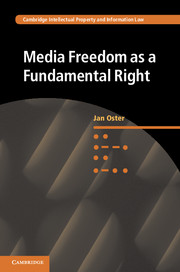Book contents
- Frontmatter
- Contents
- Preface and acknowledgements
- Table of cases
- Treaties, Conventions, Declarations and Statutes
- Reports and other documentary sources
- Introduction: aim, scope and method
- Part I The theoretical foundations of media freedom
- Part II General rules on media freedom
- Part III Specific limitations to media freedom
- 7 Personality rights and intellectual property as ‘rights of others’
- 8 Threats to public order interests: national security, territorial integrity, public safety and prevention of disorder and crime
- 9 The protection of health and morals
- 10 Maintaining the authority and impartiality of the judiciary
- 11 Incitement to hatred
- 12 Religiously offensive publications
- 13 Restrictions on commercial publications
- 14 Media pluralism
- Conclusion: tenets of a Media Freedom Principle
- Bibliography
- Index
- Cambridge Intellectual Property and Information Law
14 - Media pluralism
from Part III - Specific limitations to media freedom
Published online by Cambridge University Press: 05 June 2015
- Frontmatter
- Contents
- Preface and acknowledgements
- Table of cases
- Treaties, Conventions, Declarations and Statutes
- Reports and other documentary sources
- Introduction: aim, scope and method
- Part I The theoretical foundations of media freedom
- Part II General rules on media freedom
- Part III Specific limitations to media freedom
- 7 Personality rights and intellectual property as ‘rights of others’
- 8 Threats to public order interests: national security, territorial integrity, public safety and prevention of disorder and crime
- 9 The protection of health and morals
- 10 Maintaining the authority and impartiality of the judiciary
- 11 Incitement to hatred
- 12 Religiously offensive publications
- 13 Restrictions on commercial publications
- 14 Media pluralism
- Conclusion: tenets of a Media Freedom Principle
- Bibliography
- Index
- Cambridge Intellectual Property and Information Law
Summary
Pluralism, or plurality, is a wide and ambiguous concept. Its content varies depending on the analytical framework. The notion of pluralism includes, for example, value or moral pluralism in philosophical ethics, social, linguistic, religious and political pluralism. The concept of media pluralism absorbs these different notions of pluralism by requiring that as many voices as possible should be heard in the public discourse: different moral and political viewpoints as well as voices from different social and cultural backgrounds. It thus requires both the widest possible circulation of news and opinions and the widest access to information by the public at large. Democracy itself is inconceivable without such pluralism.
The importance of media pluralism has also been recognised in human rights texts and jurisprudence. Article 11(2) EUChFR now expressly codifies that the freedom and pluralism of the media ‘shall be respected’. Furthermore, Article 13(3) ACHR states that freedom of expression may not be restricted, inter alia, by private controls over newsprint, radio broadcasting frequencies or equipment used in the dissemination of information. Under the ICCPR, the obligation to secure media pluralism is closely connected to Article 27 ICCPR, which provides: ‘In those States in which ethnic, religious or linguistic minorities exist, persons belonging to such minorities shall not be denied the right, in community with the other members of their group, to enjoy their own culture, to profess and practice their own religion, or to use their own language’. Finally, the Strasbourg Court expressed that ‘[i]t is of the essence of democracy to allow diverse political programmes to be proposed and debated, even those that call into question the way a State is currently organised, provided that they do not harm democracy itself.’
As a consequence, states are not just compelled not to harm existing media pluralism. Rather, they are under a positive obligation to safeguard media pluralism.
- Type
- Chapter
- Information
- Media Freedom as a Fundamental Right , pp. 256 - 267Publisher: Cambridge University PressPrint publication year: 2015



